This article was co-authored by Melody Sayers, MS, RD, NASM-CPT. Melody Sayers is a Registered Dietitian and NASM (National Academy of Sports Medicine) Certified Personal Trainer. She is the owner of Elevate Your Plate®, a private nutrition counseling and personal training practice, focused on an evidence-based, individualized, realistic, and results-driven approach to improving one's health. With over 8 years of experience, Melody has worked in both the private and public health sectors, helping both individuals and communities achieve milestones in managing their weight and preventing disease. She currently holds a Certificate in Adult Weight Management and a Master of Science in Nutrition, Dietetics, and Food Science from the California State University - Northridge.
There are 9 references cited in this article, which can be found at the bottom of the page.
This article has been viewed 128,708 times.
There are many benefits to adding carbohydrates to your protein shake, because carbs are your body's number one source of fuel. They improve performance, give you energy, and allow your body to absorb more of the protein that helps build strong muscle. In a 2,000 calorie diet, 900 – 1,300 calories should be from carbs (that's 45 – 65%), or about 225 – 325 grams every day.[1] Carbs are important! Add the right carbs to your protein shake for optimal health by knowing good sources of sugar, starch, and fiber, and you'll be able to create a healthy and tasty shake.
Steps
Using the Best Ingredients
-
1Add natural sugars to your shake from fresh fruit and dairy. Sugar is a simple carbohydrate, and shows up naturally in many fruits in the form of fructose, and milk products as lactose.[2] Add milk to your protein shake for a carb boost — use 2% or skim milk for low-fat options. Experiment with blending fresh fruit into your shake for added carbs and sweetness. Be creative — you can use strawberries, bananas, raspberries, blackberries, peaches, pineapple, mango, and many more.
- Blueberries and acai also contain antioxidants, which are good for your body because they fight free radicals.[3]
- Sucrose, or regular table sugar, is also a simple carb, but it's healthier to get sugar from natural dairy or fruit sources. Avoid just dumping pure sugar into your shake.
- Measure 2 oz. (56 g) of yogurt and blend it into your shake. Choose any flavor you like for great carb boost and taste.
-
2Perk up your shake with starches. Starches give your shake good carb content because they are complex carbohydrates (lots of carbs stuck together).[4] Vegetables, grains, and legumes like beans and peas are good fresh sources of starch.
- Whey protein is the most common choice for bulking up a shake with starch. You can get whey protein at many health food stores.
- On top of that, add some starchy vegetables like sweet peas, pumpkin, squash, or yams — it will add texture and flavor, as well. It may seem strange to add vegetables to your shake, but it can result in some tasty and nutritious outcomes. Use fresh veggies, not frozen or dried.
Advertisement -
3Give your shake a fiber boost. Fiber is also a complex carbohydrate, and is found in fruit, vegetables, whole grains, beans and peas. Fiber aids in digestion, and helps you feel full more quickly.[5] Add fiber-rich fruits and veggies to your blended shake like kale, blackberries, blueberries, cranberries, strawberries, kiwi, mango, orange (whole, not juice), apple, pear, or even avocado.[6]
- For example, add 2 oz. (56 g) of strawberries or sliced apples.
- Some brands of whey protein contain fiber as well as starch. Check the nutrition facts to know for sure.[7]
-
4Throw some nuts or seeds into your shake.[8] Include 1 tbsp. (15 mL) of peanut butter for both carb and protein content, as well as to thicken the texture of your shake. Or, chop 2 oz. (56 g) of unsalted peanuts by hand with a kitchen knife. You can also use a food processor to grind 2 oz. of cashews, or unsalted sunflower seeds for added carbs.
- Some other delicious nuts and seeds to add to your protein shake include flaxseed, chia seeds, hemp seeds. You can also add in a few tablespoons of your favorite nut butter.[9]
-
5Add some grains to your protein shake. Mix 2 oz. of oatmeal in 2 tsp. (10 mL) of water, and blend it in to your shake. Oatmeal is a complex carbohydrate that helps you feel full and balance your blood sugar level. Whole grain cereal is another option.
Putting Together a Great Shake
-
1Start your protein shake with a good base. Use a quality whey protein or other protein additive. Verify that your protein additive has all essential amino acids. Amino acids help your body maintain blood and organ functions. They also help boost your metabolism.
- Ensure that your protein has low levels of cholesterol, which is not a necessary addition to healthy protein options.
- Determine if the additive contains natural proteins. Artificially produced proteins aren't as effective in building muscles as natural proteins. This should be apparent on the label — if not, ask a sales representative.
-
2Create the right carb-to-protein ratio. Generally, aim to have a 2:1 or 3:1 ratio of carbohydrates to protein, especially after a workout.[10] Plan this in advance by reading nutrition labels on your shake ingredients. It may help to write down what you are putting in your shake, and include how many grams of carbs and protein your ingredients contain. That way you can tweak your recipe to get the desired ratio.
-
3Avoid processed carbs. Unlike the natural carbohydrates found in grains and seeds, processed carbs are not good for your body. Starch and extra sugar is added to many foods, like cereal, snack bars, frozen and prepackaged meals, and energy drinks.[11] Check nutrition labels and don't add anything to your shake that contains high fructose corn syrup and other sugary, processed ingredients.
-
4Try carb supplements. Although it's best to snack on fruits, veggies, and whole grains to get carbs, you can also add carbohydrate supplements to a shake before, during, or after your workout. These “high glycemic” carbs — dextrose, glucose, and maltodextrin — require little digestion and give you a quick blood sugar spike. This helps your body absorb protein and repair muscle better. Waxy maize is another complex carb supplement that helps your body refuel by replenishing its sugar stores (called glycogen).
-
5Blend your ingredients together for a smooth shake. Start the blender at a slow speed and turn it up to medium. Shut the blender off, and pour your blended shake into a glass or travel mug. Make sure the texture is smooth and there are no sharp chunks in your shake before you enjoy it.
Expert Q&A
Did you know you can get expert answers for this article?
Unlock expert answers by supporting wikiHow
-
QuestionWhat are some good nuts to add to my shake?
 Melody Sayers, MS, RD, NASM-CPTMelody Sayers is a Registered Dietitian and NASM (National Academy of Sports Medicine) Certified Personal Trainer. She is the owner of Elevate Your Plate®, a private nutrition counseling and personal training practice, focused on an evidence-based, individualized, realistic, and results-driven approach to improving one's health. With over 8 years of experience, Melody has worked in both the private and public health sectors, helping both individuals and communities achieve milestones in managing their weight and preventing disease. She currently holds a Certificate in Adult Weight Management and a Master of Science in Nutrition, Dietetics, and Food Science from the California State University - Northridge.
Melody Sayers, MS, RD, NASM-CPTMelody Sayers is a Registered Dietitian and NASM (National Academy of Sports Medicine) Certified Personal Trainer. She is the owner of Elevate Your Plate®, a private nutrition counseling and personal training practice, focused on an evidence-based, individualized, realistic, and results-driven approach to improving one's health. With over 8 years of experience, Melody has worked in both the private and public health sectors, helping both individuals and communities achieve milestones in managing their weight and preventing disease. She currently holds a Certificate in Adult Weight Management and a Master of Science in Nutrition, Dietetics, and Food Science from the California State University - Northridge.
Registered Dietician & Personal Trainer
Warnings
- Do not replace meals with protein shakes. You might see initial weight loss, but you won't get the nutrition you need and you're very likely to put the weight — or more — back on.[12]⧼thumbs_response⧽
- Consult with your doctor before starting any new diet, exercise regimen, or use of vitamins or supplements.⧼thumbs_response⧽
References
- ↑ https://medlineplus.gov/carbohydrates.html
- ↑ https://www.cdc.gov/diabetes/managing/eat-well/diabetes-and-carbohydrates.html
- ↑ https://nutritionfacts.org/2020/11/24/acai-vs-wild-blueberries-for-artery-function/
- ↑ https://www.cdc.gov/diabetes/managing/eat-well/diabetes-and-carbohydrates.html
- ↑ https://medlineplus.gov/carbohydrates.html
- ↑ https://health.clevelandclinic.org/11-best-high-fiber-foods/
- ↑ https://www.fda.gov/food/new-nutrition-facts-label/how-understand-and-use-nutrition-facts-label
- ↑ Melody Sayers, MS, RD, NASM-CPT. Registered Dietician & Personal Trainer. Expert Interview. 6 May 2020.
- ↑ Melody Sayers, MS, RD, NASM-CPT. Registered Dietician & Personal Trainer. Expert Interview. 6 May 2020.
About This Article
To add carbs to your protein shake, use natural sugars, like fruit and milk, which are healthier for you than regular sugar. You can also add complex carbs, such as vegetables, grains, and legumes, which can help you stay full for longer periods of time. Additionally, use fiber-rich foods, which are also complex carbs, like kale, avocado, blackberries, or apples. If you want to boost your shake with both carbs and protein, toss in some nuts, nutbutters, or seeds. Alternatively, use a natural whey protein with essential amino acids to boost your metabolism, while maintaining blood and organ function. To learn how to achieve the right carb to protein ratio, keep reading!
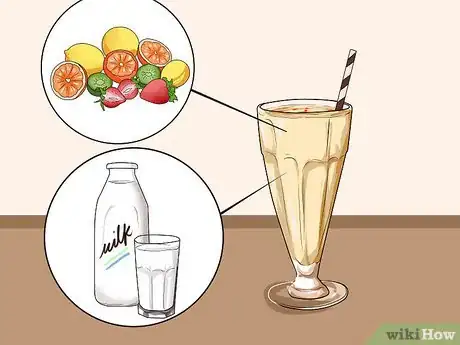
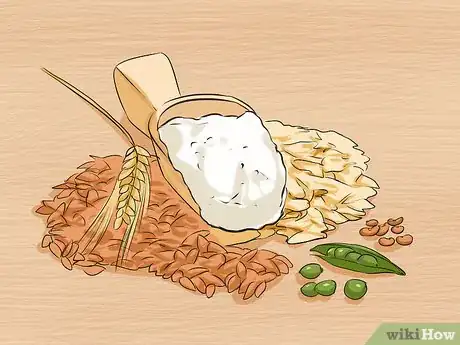
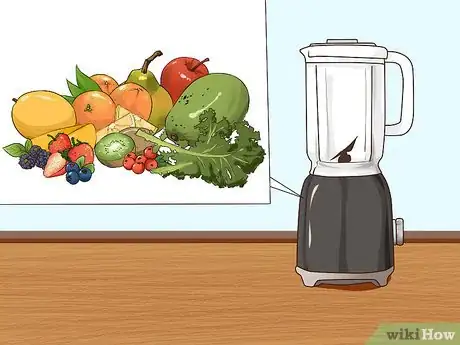
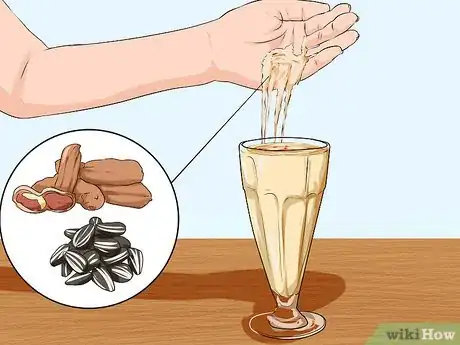

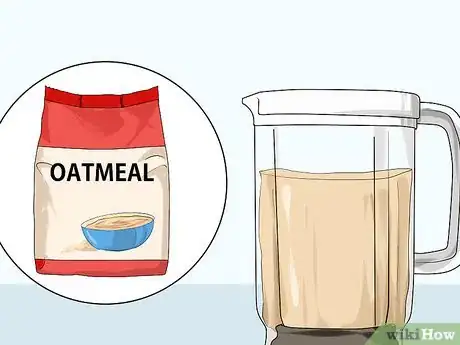
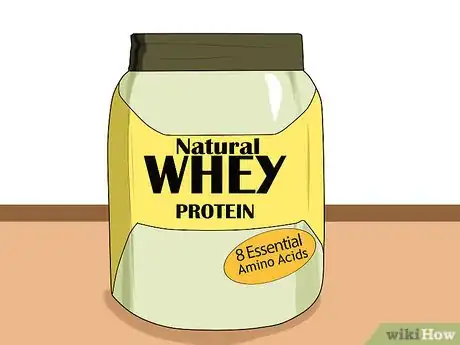
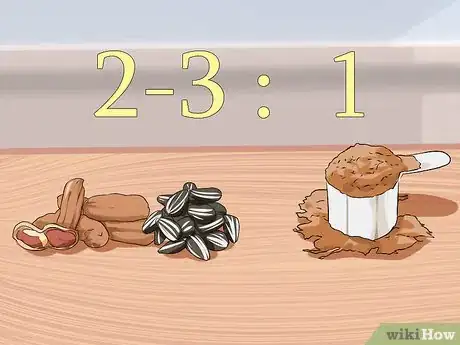
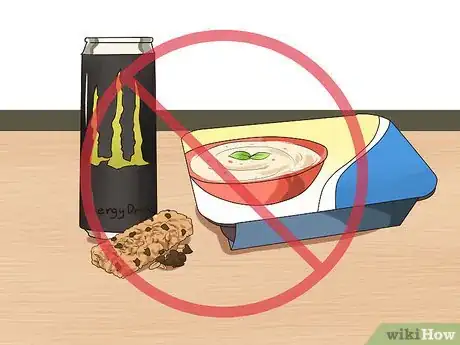
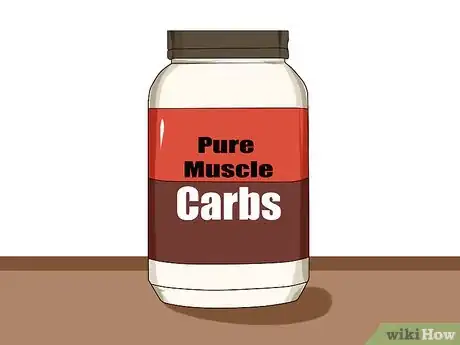


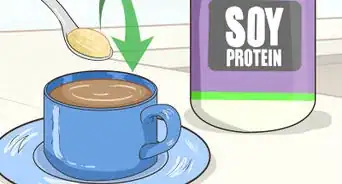















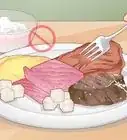





































Medical Disclaimer
The content of this article is not intended to be a substitute for professional medical advice, examination, diagnosis, or treatment. You should always contact your doctor or other qualified healthcare professional before starting, changing, or stopping any kind of health treatment.
Read More...